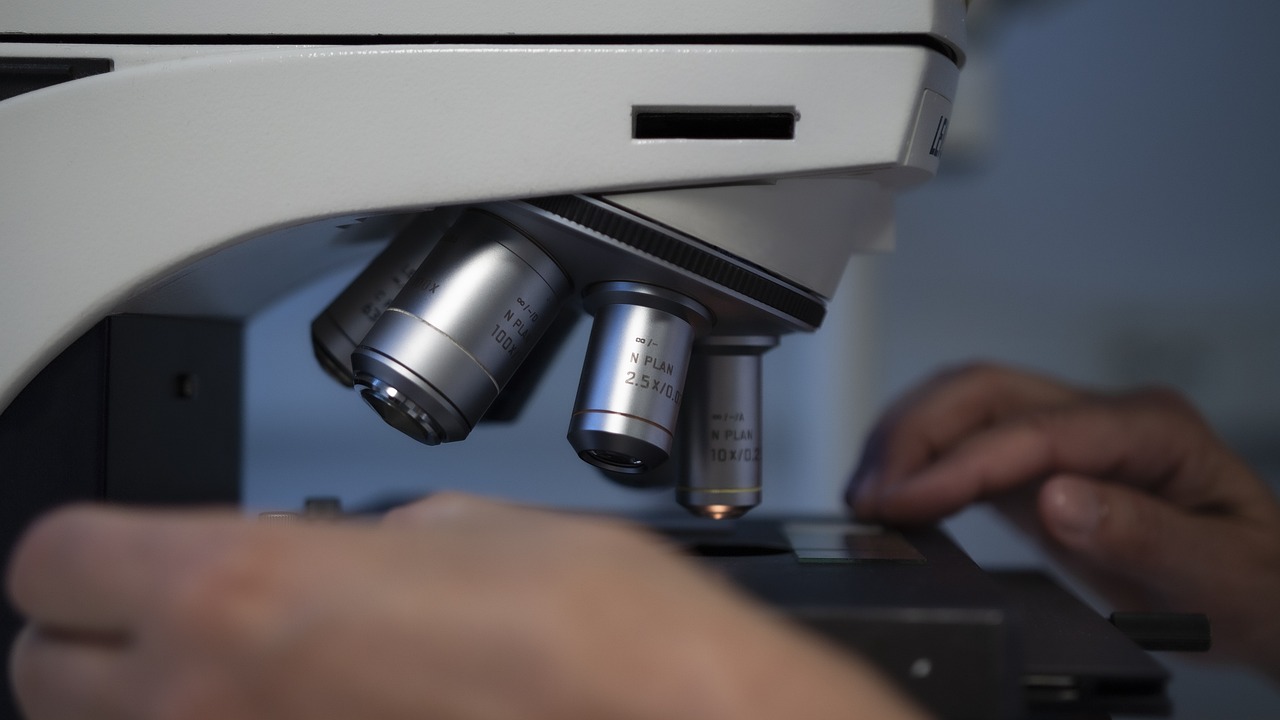How New Technologies are Revolutionizing Drug Discovery
The landscape of drug discovery is undergoing a remarkable transformation, driven by the emergence of cutting-edge technologies that are reshaping how we develop new therapies. Gone are the days when researchers relied solely on trial and error to identify potential drug candidates. Today, the integration of artificial intelligence, genomics, and biotechnology is streamlining processes and enhancing our ability to tackle complex diseases with unprecedented precision.
Imagine a world where scientists can predict how a drug will interact with the body before it even enters clinical trials. This isn't science fiction; it's a reality made possible by advancements in technology. With the help of sophisticated algorithms, researchers can analyze vast datasets to identify promising compounds, vastly reducing the time it takes to bring a new drug to market. This not only saves money but also accelerates the pace of innovation in pharmaceuticals.
As we delve deeper into the specifics, we find that the convergence of these technologies is not just a trend; it's a paradigm shift that is enhancing our understanding of the human body at a molecular level. For instance, the use of genomic technologies allows for the customization of treatments based on individual genetic profiles. This means that therapies can be tailored to maximize effectiveness while minimizing side effects, marking a significant leap towards personalized medicine.
Furthermore, the capabilities of biotechnology are expanding the horizons of drug discovery. With the development of biologics, including monoclonal antibodies and innovative vaccines, researchers are now equipped to tackle diseases that were once deemed untreatable. The promise of these technologies lies not only in their ability to treat existing conditions but also in their potential to prevent diseases before they manifest.
In this article, we will explore how these technologies—artificial intelligence, genomics, and biotechnology—are revolutionizing drug discovery, highlighting their applications, benefits, and the ethical considerations that come along with them. Join us as we navigate this exciting frontier in medicine, where the future of healthcare is being reshaped by innovation and creativity.
- What role does artificial intelligence play in drug discovery?
Artificial intelligence helps in analyzing large datasets, predicting molecular interactions, and optimizing the selection of drug compounds, making the discovery process faster and more cost-effective. - How does genomic technology contribute to personalized medicine?
Genomic technology allows researchers to tailor drug therapies to individual genetic profiles, enhancing the efficacy of treatments and reducing adverse effects. - What is CRISPR, and how is it used in drug discovery?
CRISPR is a gene-editing technology that enables precise modifications of DNA, helping researchers understand disease mechanisms and develop targeted therapies. - What are biologics, and why are they important?
Biologics are products derived from living organisms, such as monoclonal antibodies and vaccines, offering new therapeutic options for complex diseases.

Artificial Intelligence in Drug Discovery
Artificial intelligence (AI) is not just a buzzword; it’s a game-changer in the realm of drug discovery. Imagine having a super-intelligent assistant that can sift through mountains of data in a fraction of the time it would take a human. That's exactly what AI brings to the table! By analyzing vast datasets, AI can predict molecular interactions and optimize compound selection, which means researchers can focus their efforts on the most promising candidates. This revolutionary approach significantly reduces the time and costs typically associated with traditional drug discovery methods.
To put it simply, AI acts like a highly efficient detective, using algorithms to uncover patterns and insights that would remain hidden in conventional approaches. For instance, by employing machine learning techniques, AI can identify potential drug candidates that might be overlooked by human researchers. This capability not only speeds up the discovery process but also enhances the likelihood of finding effective treatments.
Furthermore, AI-driven tools can simulate how different compounds will interact with biological targets. This predictive modeling is crucial because it allows scientists to prioritize which compounds to synthesize and test in the lab. By narrowing down the options, AI helps in making informed decisions that can lead to successful drug development.
Here’s a brief overview of how AI is transforming various stages of drug discovery:
| Stage of Drug Discovery | AI Application |
|---|---|
| Target Identification | AI analyzes biological data to identify new drug targets. |
| Compound Screening | AI predicts which compounds are most likely to succeed. |
| Preclinical Testing | AI models simulate human responses to drugs, reducing the need for animal testing. |
| Clinical Trials | AI optimizes patient selection and monitors trial outcomes in real-time. |
But let's not forget that while AI is a powerful ally, it’s not without its challenges. Data quality and availability can impact the effectiveness of AI models. Moreover, the integration of AI into existing workflows requires a cultural shift within organizations. Researchers must be willing to embrace new technologies and adapt their methodologies accordingly. However, the potential rewards far outweigh these hurdles, making it an exciting time for the pharmaceutical industry.
In conclusion, AI is revolutionizing drug discovery by making it faster, cheaper, and more efficient. As this technology continues to evolve, we can expect to see even more groundbreaking advancements that will change the way we approach healthcare. The future of medicine is not just bright; it’s illuminated by the incredible possibilities that AI offers!
- What role does AI play in drug discovery? AI helps analyze data, predict interactions, and optimize compound selection, making drug discovery faster and more efficient.
- Can AI completely replace human researchers? While AI can enhance the drug discovery process, human expertise is still essential for interpretation and decision-making.
- What are the challenges of using AI in drug discovery? Data quality, integration into workflows, and the need for cultural shifts within organizations are some of the challenges faced.

Genomic Technologies and Personalized Medicine
Genomic technologies are at the forefront of a medical revolution, allowing us to move away from the traditional one-size-fits-all approach to treatment. Imagine a world where your medication is tailored specifically to your unique genetic makeup—sounds like science fiction, right? But it's happening now! By analyzing individual genomes, researchers can design therapies that are not only more effective but also significantly reduce the risk of adverse side effects. This shift towards personalized medicine is not just a trend; it's a fundamental change in how we approach healthcare.
At the heart of this transformation is the ability to decode the human genome, which has opened up new avenues for understanding diseases. With the help of advanced sequencing technologies, scientists can identify genetic variations that contribute to various health conditions. This information is gold for drug developers, as it allows them to pinpoint the most promising targets for new therapies. For instance, in cancer treatment, knowing the specific mutations present in a tumor can lead to the development of targeted therapies that attack those mutations directly, improving the chances of successful treatment.
Furthermore, the integration of genomic data with other biological information is enhancing our understanding of complex diseases. By leveraging big data analytics and machine learning, researchers can analyze vast amounts of genetic and clinical data to uncover patterns that were previously hidden. This not only speeds up the drug discovery process but also ensures that the therapies developed are grounded in robust scientific evidence. The result? More effective treatments that cater to the individual needs of patients.
One of the most exciting developments in genomic technologies is CRISPR, a powerful tool for gene editing. This technology allows scientists to modify specific genes with unprecedented precision, enabling them to study the effects of genetic changes on disease. For example, researchers can create models of genetic disorders by editing the genes of organisms, which helps in understanding the underlying mechanisms of these diseases. This knowledge is crucial for developing targeted therapies that can effectively address the root causes of conditions rather than just alleviating symptoms.
CRISPR is not just a laboratory curiosity; it has real-world applications in drug discovery and development. By utilizing CRISPR, researchers can:
- Create accurate disease models that mimic human conditions.
- Identify potential drug targets more efficiently.
- Accelerate the validation of therapeutic candidates in preclinical studies.
This streamlined process can drastically reduce the time it takes to bring new drugs to market, which is a game-changer in the pharmaceutical industry.
However, with great power comes great responsibility. The rise of gene editing technologies like CRISPR raises important ethical questions, particularly regarding their use in human subjects. As we stand on the brink of being able to edit genes to cure diseases, we must engage in robust discussions about the moral implications of such technologies. What happens if these technologies are misused? How do we ensure equitable access to these advancements? These are critical questions that society must address as we move forward.
In summary, genomic technologies are revolutionizing the field of personalized medicine, offering unprecedented opportunities to tailor treatments to individual patients. By harnessing the power of genomics, we are not only improving the efficacy of therapies but also paving the way for a future where healthcare is truly personalized.

CRISPR and Gene Editing
The advent of CRISPR technology has been nothing short of revolutionary in the field of drug discovery. Imagine having a pair of molecular scissors that can precisely cut and modify DNA at specific locations; that’s essentially what CRISPR does. This powerful tool allows scientists to edit genes with unprecedented accuracy, making it easier to understand the underlying mechanisms of diseases. By targeting specific genes, researchers can not only identify what goes wrong in genetic disorders but also develop targeted therapies that can correct these issues.
One of the most exciting aspects of CRISPR is its ability to create disease models. These models are crucial for studying how diseases develop and progress, and they serve as a platform for testing new drugs. For instance, researchers can use CRISPR to knock out genes in cell lines or animal models, mimicking human diseases. This enables them to observe the effects of potential drug candidates on these models, speeding up the process of drug discovery significantly. The implications for conditions like cancer, cystic fibrosis, and muscular dystrophy are enormous, as this technology can help to pinpoint the most effective treatment strategies.
However, with great power comes great responsibility. The use of gene editing technologies like CRISPR raises a plethora of ethical considerations. Questions about the morality of editing human genes, especially in embryos, spark heated debates among scientists, ethicists, and the public. It’s essential to have ongoing discussions about the regulations surrounding gene editing, ensuring that these technologies are used responsibly and ethically. For instance, should we allow gene editing to eliminate genetic diseases, or does that open the door to designer babies? These are tough questions that society must grapple with as the technology advances.
To summarize, CRISPR is not just a scientific breakthrough; it’s a double-edged sword that holds the potential to change the landscape of medicine. As researchers continue to explore its applications, the need for ethical guidelines becomes increasingly critical. The journey of CRISPR in drug discovery is just beginning, and its future promises to be as exciting as it is complex.
- What is CRISPR technology?
CRISPR is a gene-editing tool that allows scientists to modify DNA with high precision, enabling targeted changes to the genetic code.
- How does CRISPR work?
CRISPR works by using a guide RNA to identify specific DNA sequences and the Cas9 enzyme to cut the DNA at those locations, allowing for modifications.
- What are the applications of CRISPR in medicine?
CRISPR has applications in developing disease models, understanding genetic disorders, and creating targeted therapies for conditions like cancer and genetic diseases.
- Are there ethical concerns regarding CRISPR?
Yes, ethical concerns include the implications of editing human genes, potential misuse of the technology, and the moral implications of creating genetically modified organisms.

Applications of CRISPR in Research
CRISPR technology has opened a new frontier in the realm of scientific research, acting as a powerful tool that enables researchers to edit genes with unprecedented precision. This revolutionary technique is not just about altering genetic sequences; it's about unlocking the mysteries of life itself. Imagine being able to pinpoint the exact genetic mutation responsible for a disease and then correcting it. That's the kind of potential CRISPR brings to the table, and researchers are harnessing this power in various innovative ways.
One of the most exciting applications of CRISPR is the creation of disease models. By using CRISPR to introduce specific genetic changes in organisms, scientists can mimic human diseases in laboratory settings. This allows for a deeper understanding of how diseases develop and progress. For instance, researchers can create mouse models that exhibit symptoms of human cancers, which can be invaluable for testing new treatments. The ability to study these models helps in identifying potential drug targets and understanding the underlying mechanisms of diseases.
Moreover, CRISPR is accelerating the identification of new therapeutic candidates. Traditional methods of drug discovery can be time-consuming and costly, often taking years to yield results. However, with CRISPR, researchers can quickly validate whether a specific gene is a viable target for drug development. For example, if a gene is suspected to play a role in a particular disease, scientists can use CRISPR to knock it out and observe the effects. If the disease symptoms are alleviated, it provides a strong indication that targeting that gene could lead to effective treatments.
Another significant application is in the field of gene therapy. CRISPR has the potential to correct genetic defects at their source, offering hope for conditions that currently have no cure. For instance, researchers are exploring the possibility of using CRISPR to treat genetic disorders such as cystic fibrosis or sickle cell disease. By directly editing the faulty genes, it may be possible to alleviate or even eliminate the symptoms associated with these conditions.
However, while the applications of CRISPR are vast and promising, it's essential to approach this technology with caution. As researchers delve deeper into gene editing, they must consider the ethical implications and potential long-term consequences of their work. The questions surrounding the use of CRISPR in human subjects, for instance, are profound and require thorough discussions and regulations to ensure responsible usage.
In summary, CRISPR technology is not just a passing trend; it is a game-changer in research. Its applications in creating disease models, validating therapeutic candidates, and potentially curing genetic disorders are paving the way for breakthroughs that were once thought to be the stuff of science fiction. As we continue to explore and refine this technology, the future of medicine looks brighter than ever.
- What is CRISPR? CRISPR is a revolutionary gene-editing technology that allows scientists to modify an organism's DNA with high precision.
- How does CRISPR work? It works by utilizing a guide RNA to direct the Cas9 enzyme to a specific location in the DNA, where it can make cuts, allowing for the addition or removal of genetic material.
- What are the ethical concerns surrounding CRISPR? Ethical concerns include the potential for unintended consequences in gene editing, the implications of editing human embryos, and the need for regulations to prevent misuse.
- Can CRISPR be used in humans? Yes, CRISPR is being explored for use in human gene therapy, but it is still in the experimental stages and requires extensive testing for safety and efficacy.

Ethical Considerations of Gene Editing
The advent of gene editing technologies, particularly CRISPR, has opened up a Pandora's box of possibilities in the realm of medicine and beyond. While the potential benefits are staggering—ranging from curing genetic disorders to enhancing agricultural yields—these advancements also bring forth a myriad of ethical considerations that cannot be overlooked. One of the most pressing concerns is the potential for designer babies, where parents might opt for genetic modifications to enhance physical attributes or intelligence, raising questions about the definition of normalcy and the implications of playing God.
Moreover, the possibility of unintended consequences is a significant concern. When editing genes, there is always a risk of off-target effects, which could lead to unforeseen health issues. This uncertainty raises ethical dilemmas about consent, especially when it comes to editing the germline—changes that would be passed down to future generations. Should we be allowed to make decisions that affect not just an individual but their descendants?
Additionally, there are socio-economic implications to consider. If gene editing becomes a reality, will it be accessible to everyone, or will it create a divide between those who can afford such technologies and those who cannot? This disparity could exacerbate existing inequalities, leading to a society where genetic enhancements are a privilege of the wealthy. Thus, it is crucial to ensure that ethical frameworks are in place to govern the use of gene editing technologies.
In light of these concerns, it is essential for scientists, ethicists, and policymakers to engage in ongoing discussions about the regulations surrounding gene editing. A comprehensive approach should encompass:
- Robust ethical guidelines to govern research and clinical applications.
- Public engagement to understand societal values and concerns.
- International cooperation to establish global standards and prevent misuse.
Ultimately, as we stand on the brink of a new era in medicine, it is our collective responsibility to navigate these ethical waters carefully. The promise of gene editing is immense, but without a thoughtful approach to its implementation, we risk sailing into uncharted and potentially dangerous territories.
What is gene editing?
Gene editing refers to the process of making precise changes to the DNA of an organism. Technologies like CRISPR allow scientists to add, remove, or alter genetic material at particular locations in the genome.
What are the potential benefits of gene editing?
Gene editing has the potential to treat genetic disorders, enhance agricultural crops, and even combat diseases like cancer and HIV. By correcting genetic mutations, it may provide cures for conditions that are currently deemed incurable.
What ethical concerns are associated with gene editing?
Ethical concerns include the potential for designer babies, unintended genetic consequences, socio-economic disparities, and the moral implications of altering human genetics. These issues necessitate careful consideration and robust regulatory frameworks.
How can we ensure responsible use of gene editing technologies?
To ensure responsible use, it is vital to establish ethical guidelines, engage the public in discussions, and promote international cooperation to set standards that prevent misuse and ensure equitable access.

High-Throughput Screening Techniques
High-throughput screening (HTS) techniques have emerged as a game-changer in the realm of drug discovery. Imagine being able to test thousands of compounds in a matter of days instead of months! This revolutionary approach allows researchers to rapidly identify potential drug candidates by automating the testing process. By utilizing sophisticated robotics and advanced software, HTS can analyze vast libraries of chemical compounds, significantly accelerating the pace of discovery.
The essence of HTS lies in its ability to perform multiple experiments simultaneously. For instance, instead of manually testing one compound at a time, scientists can screen hundreds or even thousands of them in parallel. This not only saves time but also enhances the chances of finding effective drug candidates. With the integration of data analytics and machine learning, researchers can swiftly interpret the results, identifying promising compounds based on their biological activity.
One of the key advantages of HTS is its ability to uncover novel drug candidates that may have been overlooked using traditional methods. By systematically testing a wide array of compounds, researchers can discover unexpected interactions and biological pathways. This opens up new avenues for drug development, especially for diseases that have been challenging to treat. For instance, HTS has been instrumental in the rapid identification of potential treatments for emerging infectious diseases and complex conditions such as cancer.
However, it’s essential to note that while HTS offers immense potential, it is not without its challenges. The sheer volume of data generated can be overwhelming, requiring sophisticated computational tools to analyze and interpret the results effectively. Additionally, the quality of the compounds being tested is crucial; if the compounds are not well-characterized, it could lead to false positives or negatives. Therefore, researchers must ensure that the libraries of compounds used in HTS are diverse and of high quality.
To give you a clearer picture, here’s a simple comparison of traditional screening methods versus high-throughput screening:
| Aspect | Traditional Screening | High-Throughput Screening |
|---|---|---|
| Speed | Months to Years | Days to Weeks |
| Number of Compounds Tested | Hundreds | Thousands |
| Automation | Low | High |
| Data Analysis | Manual | Automated with AI |
In conclusion, high-throughput screening techniques are not just a trend; they are reshaping the landscape of drug discovery. By enabling rapid testing and analysis, HTS is paving the way for innovative treatments and therapies that could change lives. As technology continues to evolve, we can expect even more breakthroughs in this exciting field.
- What is high-throughput screening? High-throughput screening is a method that allows researchers to quickly conduct millions of chemical, genetic, or pharmacological tests. It uses automation to rapidly test thousands of compounds in parallel.
- How does HTS benefit drug discovery? HTS significantly speeds up the process of identifying potential drug candidates, allowing for the testing of a larger number of compounds in a shorter time frame.
- What are the challenges associated with HTS? The main challenges include managing the vast amount of data generated and ensuring the quality of the compounds being tested to avoid false results.

Biotechnology and Biologics
Biotechnology has emerged as a game-changer in the pharmaceutical industry, particularly in the development of biologics. These are products derived from living organisms and include a wide range of therapeutic options, such as monoclonal antibodies and vaccines. Unlike traditional small-molecule drugs, biologics are often more complex in structure and function, allowing them to target diseases in a more specific manner. This specificity not only enhances the efficacy of treatments but also minimizes side effects, making them a preferred choice for many patients.
The rise of biologics has transformed the treatment landscape for a variety of complex diseases, including cancer, autoimmune disorders, and infectious diseases. For instance, monoclonal antibodies have revolutionized cancer therapy by specifically targeting cancer cells, thereby sparing healthy cells from damage. This targeted approach can significantly improve the overall treatment outcomes for patients, leading to longer survival rates and improved quality of life.
Moreover, the advancements in biotechnology have paved the way for innovative vaccine development. The recent success of mRNA vaccines is a prime example of how biotechnology can respond swiftly to emerging health threats. These vaccines work by instructing cells to produce a harmless piece of the virus, triggering an immune response without causing the disease itself. This technology has not only been pivotal in combating the COVID-19 pandemic but also holds promise for future vaccines against other infectious diseases.
As we delve deeper into the world of biotechnology, it's essential to recognize the various applications of biologics. Below is a table summarizing some key types of biologics and their uses:
| Type of Biologic | Examples | Applications |
|---|---|---|
| Monoclonal Antibodies | Rituximab, Trastuzumab | Cancer treatment, autoimmune disorders |
| Vaccines | mRNA vaccines, viral vector vaccines | Infectious disease prevention |
| Gene Therapies | Luxturna, Zolgensma | Genetic disorders treatment |
It's crucial to note that while the benefits of biotechnology and biologics are vast, there are also challenges that must be addressed. The complexity of biologics means that they often require specialized manufacturing processes and stringent regulatory oversight. Additionally, there's an ongoing discussion about the cost of these therapies, which can be significantly higher than traditional small-molecule drugs. As the industry evolves, balancing accessibility and innovation will be key to ensuring that patients benefit from these groundbreaking treatments.
- What are biologics? Biologics are products derived from living organisms, including proteins, antibodies, and vaccines, used to treat various diseases.
- How do monoclonal antibodies work? Monoclonal antibodies are engineered to target specific antigens on cells, particularly in cancer therapy, enhancing treatment effectiveness.
- What role does biotechnology play in vaccine development? Biotechnology enables the rapid development of vaccines, such as mRNA vaccines, which can quickly respond to emerging infectious diseases.
- Are biologics more effective than traditional drugs? Biologics often provide targeted treatment options that can improve efficacy and reduce side effects compared to traditional small-molecule drugs.

Advancements in Monoclonal Antibodies
The field of monoclonal antibodies has seen **remarkable advancements** over the past few years, transforming the landscape of treatment options for various diseases. These engineered antibodies are designed to target specific antigens, which makes them incredibly effective in treating conditions like cancer, autoimmune disorders, and infectious diseases. What’s truly fascinating is how these advancements are not just theoretical; they are leading to real-world applications that are saving lives.
One of the most significant breakthroughs in monoclonal antibody technology is the development of **bispecific antibodies**. Unlike traditional monoclonal antibodies that bind to a single target, bispecific antibodies can simultaneously engage two different antigens. This dual targeting can enhance therapeutic efficacy and improve patient outcomes. For instance, bispecific antibodies are being tailored to redirect T-cells to cancer cells, making the immune response much more effective. Imagine a superhero team-up where two heroes join forces to combat a villain—this is essentially what bispecific antibodies are doing in the body!
Furthermore, advancements in **humanization techniques** have led to the creation of monoclonal antibodies that are less likely to provoke an immune response in human patients. This is crucial because, historically, many monoclonal antibodies derived from mouse models were recognized as foreign by the human immune system, leading to adverse effects. The newer, humanized antibodies are designed to mimic human proteins more closely, resulting in improved safety profiles and better patient tolerance.
Another area where we've witnessed significant progress is in the **manufacturing processes** of monoclonal antibodies. With the advent of **cell culture technologies** and **bioreactor systems**, the production of these antibodies has become more efficient and cost-effective. This not only increases the availability of these life-saving therapies but also reduces the overall cost of treatment, making them accessible to a broader range of patients.
To put it into perspective, let’s look at some of the key advancements in monoclonal antibodies:
| Advancement | Description | Impact |
|---|---|---|
| Bispecific Antibodies | Engage two different antigens simultaneously. | Enhanced therapeutic efficacy against cancer. |
| Humanization Techniques | Reduce immune response to foreign proteins. | Improved safety and tolerance in patients. |
| Advanced Manufacturing | More efficient production methods. | Lower costs and increased availability. |
In addition to these advancements, monoclonal antibodies are also being explored in combination therapies. By pairing them with other treatment modalities, such as chemotherapy or targeted therapies, researchers are finding that they can achieve synergistic effects, leading to improved outcomes for patients. Think of it like a well-coordinated dance—when each partner knows their role and works together, the result is a stunning performance.
As we continue to push the boundaries of science and technology, the future of monoclonal antibodies looks incredibly promising. With ongoing research and development, we can expect to see even more innovative therapies emerge, providing hope for patients battling some of the most challenging diseases of our time.
- What are monoclonal antibodies? Monoclonal antibodies are lab-made molecules that can mimic the immune system's ability to fight off harmful pathogens such as viruses.
- How do monoclonal antibodies work? They work by binding to specific targets (antigens) on cells, marking them for destruction by the immune system.
- Are there any side effects associated with monoclonal antibodies? While generally well-tolerated, some patients may experience side effects such as allergic reactions, fever, or chills.
- What diseases can monoclonal antibodies treat? They are used to treat a variety of conditions, including cancers, autoimmune diseases, and infectious diseases.

Vaccines and Infectious Diseases
This article explores the transformative impact of emerging technologies on drug discovery processes, highlighting advancements in artificial intelligence, genomics, and biotechnology that are reshaping the pharmaceutical landscape.
Artificial intelligence is streamlining drug discovery by analyzing vast datasets, predicting molecular interactions, and optimizing compound selection, significantly reducing time and costs associated with traditional methods.
Genomic technologies are paving the way for personalized medicine, allowing researchers to tailor drug therapies based on individual genetic profiles, enhancing efficacy and minimizing adverse effects.
CRISPR technology is revolutionizing drug discovery by enabling precise gene editing, facilitating the identification of disease mechanisms, and accelerating the development of targeted therapies for genetic disorders.
Researchers are utilizing CRISPR to create disease models, enhancing the understanding of drug targets and accelerating the validation of therapeutic candidates in preclinical studies.
The rise of gene editing technologies raises ethical questions regarding their use in human subjects, necessitating robust discussions on regulations and moral implications surrounding genetic modifications.
High-throughput screening allows for the rapid testing of thousands of compounds, significantly speeding up the identification of drug candidates and enhancing the efficiency of the drug discovery pipeline.
Biotechnology is driving the development of biologics, including monoclonal antibodies and vaccines, which offer novel therapeutic options for complex diseases, further diversifying the drug discovery landscape.
Recent advancements in monoclonal antibody technology have led to the creation of highly specific therapies, improving treatment outcomes for conditions such as cancer and autoimmune diseases.
Innovations in vaccine technology, particularly the emergence of mRNA platforms, have significantly altered the landscape of infectious disease prevention. Traditional vaccines often rely on weakened or inactivated pathogens, but mRNA vaccines introduce a new paradigm by using a small piece of genetic material to instruct cells to produce a harmless piece of the virus. This triggers an immune response without causing disease, effectively training the immune system to recognize and combat the actual pathogen.
For instance, the rapid development of the COVID-19 mRNA vaccines showcased how quickly science can respond to a global health crisis. Within months, these vaccines were created, tested, and distributed, demonstrating an unprecedented speed in vaccine development. This agility not only helps in managing current outbreaks but also prepares us for potential future pandemics.
Moreover, the versatility of mRNA technology means it can be adapted to target various infectious diseases. Researchers are now exploring its application beyond COVID-19, aiming to develop vaccines for diseases like influenza, Zika, and even HIV. This adaptability is crucial in our ever-changing world where new pathogens can emerge unexpectedly.
However, the evolution of vaccine technology is not without its challenges. Public perception, misinformation, and vaccine hesitancy can hinder the uptake of these life-saving innovations. Therefore, it is essential for health authorities and scientists to engage with communities, providing clear and accurate information about vaccine safety and efficacy.
In summary, the integration of advanced technologies in vaccine development is revolutionizing how we approach infectious diseases, offering hope for more effective and quicker responses to future health threats.
- What are mRNA vaccines?
mRNA vaccines use messenger RNA to instruct cells to produce a protein that triggers an immune response, offering protection against specific diseases.
- How quickly can vaccines be developed using new technologies?
With advancements in technology, vaccines can now be developed in a matter of months instead of years, as seen with the COVID-19 vaccines.
- What are the benefits of personalized vaccines?
Personalized vaccines can be tailored to an individual's genetic makeup, potentially increasing their effectiveness and reducing side effects.
Frequently Asked Questions
- What role does artificial intelligence play in drug discovery?
Artificial intelligence (AI) is a game-changer in drug discovery. It analyzes massive datasets to predict how different molecules will interact, which helps researchers identify promising drug candidates much faster than traditional methods. By optimizing compound selection, AI significantly cuts down the time and costs associated with bringing new drugs to market.
- How do genomic technologies contribute to personalized medicine?
Genomic technologies allow for the tailoring of drug therapies based on an individual’s unique genetic makeup. This means treatments can be more effective and have fewer side effects. By understanding a patient’s genetic profile, researchers can develop personalized therapies that specifically target the underlying causes of diseases.
- What is CRISPR and how is it used in drug discovery?
CRISPR is a revolutionary gene-editing technology that enables scientists to make precise modifications to DNA. In drug discovery, it helps researchers create disease models, which are crucial for understanding how diseases work and identifying potential drug targets. This accelerates the development of targeted therapies for genetic disorders.
- What are the ethical considerations surrounding gene editing?
The emergence of gene editing technologies like CRISPR raises important ethical questions, especially regarding their application in humans. Discussions about regulations, moral implications, and the potential for unintended consequences are vital to ensure responsible use of these powerful tools in medicine.
- What is high-throughput screening and why is it important?
High-throughput screening is a method that allows researchers to quickly test thousands of compounds for potential drug activity. This process speeds up the identification of promising drug candidates, making the overall drug discovery pipeline more efficient and effective.
- How is biotechnology influencing drug development?
Biotechnology is transforming drug development by enabling the creation of biologics, such as monoclonal antibodies and vaccines. These innovative therapies provide new options for treating complex diseases, thereby expanding the possibilities within the pharmaceutical landscape.
- What advancements have been made in monoclonal antibody technology?
Recent advancements in monoclonal antibody technology have led to the development of highly specific therapies that improve treatment outcomes for conditions like cancer and autoimmune diseases. These targeted therapies are designed to attack only the disease cells, minimizing damage to healthy tissue.
- How are vaccines being revolutionized by new technologies?
Innovations in vaccine technology, particularly mRNA platforms, are changing the way we respond to infectious diseases. These technologies allow for rapid development and deployment of vaccines, enhancing our ability to combat emerging pathogens and improve global health security.



















